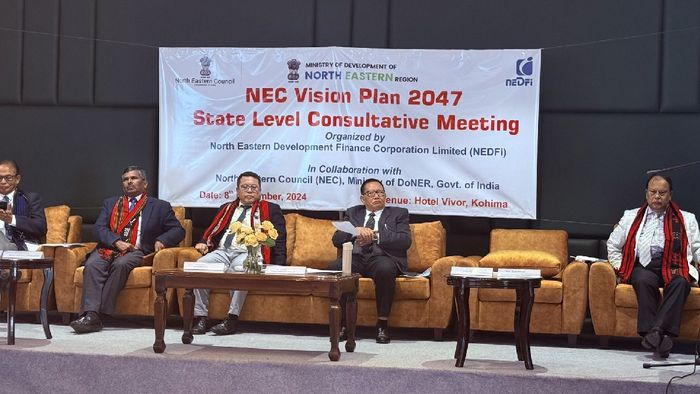Nagaland Deputy CM outlines core pillars for state's economic growth
Nagaland Deputy CM outlines Vision 2047, focusing on economic growth, cultural heritage, and infrastructure. Emphasis on modern agriculture, connectivity, and healthcare upgrades.

- Nov 09, 2024,
- Updated Nov 09, 2024, 9:11 AM IST
Nagaland Deputy Chief Minister T R Zeliang outlined key priorities for the state in 2047, emphasising the goal of fostering a vibrant economy that honours its cultural heritage while promoting inclusive growth for all communities.
Zeliang stressed importance of integrating socio-economic growth, cultural preservation, infrastructure development, and environmental sustainability as the core pillars of the 2047 vision.
The Deputy CM was speaking at the state-level consultative meeting for NEC Vision Plan 2047 in Kohima, organised by North Eastern Development Finance Corporation Limited (NEDFi) in collaboration with North Eastern Council (NEC) and Ministry of DoNER.
Key stakeholders, including officials from NEDFi, the NEC, and state government representatives will participate in the meeting and discuss long-term goals for the state's sustainable development.
Zeliang highlighted that the state aims to achieve Viksit Bharat (developed India), further emphasising the need to modernise agriculture in the state.
He proposed the integration of advanced technologies, organic farming methods, and sustainable practices to enhance food security and open new avenues for export.
Furthermore, the Nagaland Deputy CM also underscored the importance of capacity building for farmers and expanding agricultural infrastructure such as irrigation systems and cold storage facilities.
Addressing the state’s infrastructure challenges, he called for greater investments in road networks, as well as the development of air, rail, and water transport systems aiming seamless connectivity between rural and urban centers.
Nagaland government has also sought the support of the NEC for the development of warehouses and cold storage facilities at bus depots and transport terminals.
At the meet, Nagaland’s rich cultural diversity was exalted as an important resource for economic development.
Deputy CM Zeliang increased investments in cultural promotion, including establishing state-of-the-art exhibition spaces and capacity-building initiatives.
He also identified tourism as a potential revenue-generating sector, given the state’s natural beauty and heritage sites.
Pointing towards the potential for agro-based industrial growth in the state, Zeliang said with favorable climatic conditions for the cultivation of a variety of fruits and vegetables, Nagaland has the opportunity to develop food processing industries.
On the healthcare front, he called for a significant upgrade to the state’s healthcare infrastructure, including the establishment of multi-specialty hospitals, the development of PSA Oxygen Plants, and the introduction of climate-resilient healthcare facilities.
The former chief minister also highlighted the need for better infrastructure in higher educational institutions, including academic buildings, hostels, and laboratories, as well as facilities for skill development and entrepreneurship.
Zeliang said that a critical issue raised during the meeting was the delayed release of funds for agricultural and infrastructural projects, particularly in a state like Nagaland, which faces a short working season due to its monsoon-heavy climate.
He urged NEC officials to advocate for a more aligned timeline for fund disbursement, ensuring that projects can be implemented efficiently during the appropriate season. (With PTI inputs)